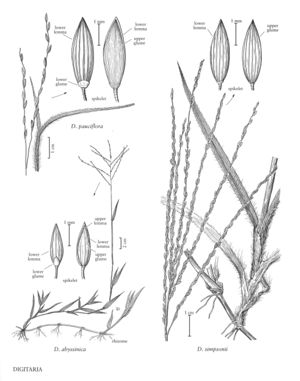Difference between revisions of "Digitaria simpsonii"
FNA>Volume Importer |
imported>Volume Importer |
||
| (4 intermediate revisions by 2 users not shown) | |||
| Line 3: | Line 3: | ||
|accepted_authority=(Vasey) Fernald | |accepted_authority=(Vasey) Fernald | ||
|publications= | |publications= | ||
| + | |special_status={{Treatment/ID/Special_status | ||
| + | |code=E | ||
| + | |label=Endemic | ||
| + | }} | ||
|basionyms= | |basionyms= | ||
|synonyms= | |synonyms= | ||
| Line 16: | Line 20: | ||
-->{{Treatment/Body | -->{{Treatment/Body | ||
|distribution=Fla. | |distribution=Fla. | ||
| − | |discussion=<p>Digitaria simpsonii is a rare species, known only from sandy fields in Florida.</p> | + | |discussion=<p><i>Digitaria simpsonii</i> is a rare species, known only from sandy fields in Florida.</p> |
|tables= | |tables= | ||
|references= | |references= | ||
| Line 25: | Line 29: | ||
-->{{#Taxon: | -->{{#Taxon: | ||
name=Digitaria simpsonii | name=Digitaria simpsonii | ||
| − | |||
|authority=(Vasey) Fernald | |authority=(Vasey) Fernald | ||
|rank=species | |rank=species | ||
| Line 32: | Line 35: | ||
|basionyms= | |basionyms= | ||
|family=Poaceae | |family=Poaceae | ||
| − | |illustrator=Linda A. Vorobik | + | |illustrator=Linda A. Vorobik;Hana Pazdírková |
| + | |illustration copyright=Utah State University | ||
|distribution=Fla. | |distribution=Fla. | ||
|reference=None | |reference=None | ||
|publication title= | |publication title= | ||
|publication year= | |publication year= | ||
| − | |special status= | + | |special status=Endemic |
| − | |source xml=https:// | + | |source xml=https://bitbucket.org/aafc-mbb/fna-data-curation/src/200273ad09963decb8fc72550212de541d86569d/coarse_grained_fna_xml/V25/V25_1075.xml |
|subfamily=Poaceae subfam. Panicoideae | |subfamily=Poaceae subfam. Panicoideae | ||
|tribe=Poaceae tribe Paniceae | |tribe=Poaceae tribe Paniceae | ||
Latest revision as of 17:55, 11 May 2021
Plants of indefinite duration; not rhizomatous. Culms 80-120 cm, erect or decumbent and rooting at the lower nodes, not branching at the aerial nodes. Sheaths hirsute, with papillose-based hairs, those of the innovation sheaths compressed-keeled; ligules 1-2 mm; blades 7-30 cm long, 3-5 mm wide, flat, pilose above and below. Panicles with 6-8 spikelike primary branches on 4-6 cm rachises; primary branches 8-13 cm, axes triquetrous, narrowly winged, wings less than 1/2 as wide as the midribs, lower and middle portions of the branches bearing spikelets in appressed, unequally pedicellate pairs; secondary branches rarely present; axillary inflorescences not present; pedicels not adnate to the branch axes. Spikelets about 3 mm, elliptic lanceolate, acute. Lower glumes absent or minute and hyaline; upper glumes 7-9-veined, glabrous or obscurely pubescent; lower lemmas 7-9-veined, glabrous or obscurely pubescent; upper lemmas elliptic, yellow or gray, becoming purple at maturity, slightly apiculate. 2n = unknown.
Discussion
Digitaria simpsonii is a rare species, known only from sandy fields in Florida.
Selected References
None.
